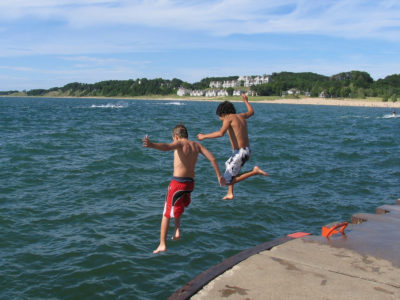Each year hundreds of Canadians are injured or die in diving accidents as a result of jumping or diving from cliffs, bridges, docks, rafts, but most commonly, from diving into swimming pools.
Diving is the leading sports-related cause of spinal cord injuries, according to The Canadian Red Cross website, www.redcross.ca. “Many diving incidents leave the diver completely paralyzed from the neck down,” states the Red Cross. “Ninety-five percent of diving injuries occur in water 1.5 metres deep or less, in an unsupervised setting with no warning signs. The average person who suffers a diving-related spinal cord injury is male, 17 to 22 years old, with no formal training in diving and who is visiting the location for the first time.”
The Red Cross further states that over half of diving injuries involve alcohol and/or drug use and over 40% of spinal injuries caused by careless diving occur in backyard pools. Statistics show that spinal injuries are rare during supervised diving into water that is at least 2.7 metres deep. (Source www.redcross.ca, Diving accidents)
Entering the water feet first as a precaution to check the water depth is advised by The Canadian Red Cross. Jump before you dive is sage advice which can save lives. The site cautions that most in-ground home and hotel pools, even those with diving boards, may be unsafe for diving, especially for adult males. “The deep end is often too short and the diver can strike his head on the slope of the pool leading up toward the shallow end. Check the shape and length of the pool or waterfront bottom to be sure the diving area is large enough and deep enough for the intended dive. It should be twice your height for the whole dive. The presence of a diving board does not necessarily mean that it is safe to dive.” The Canadian Red Cross offers two DVD programs through their website aimed at preventing diving-related injuries in pools, rivers and lakes. Dive Smart is geared to children up to age 11 while Sudden Impact is targeted to youth and adults, age 12 and up, aimed at preventing diving-related injuries in pools as well as rivers and lakes. The program discussed common causes of diving-related injuries, strategies to minimize risk and deal with dangerous situations safely, along with tips and techniques to make diving safer and more fun. Dramatization of realistic events and peer testimonials bring the real danger of unsafe diving to life.
Diving accidents can be life-altering. That one quick moment of fun when a swimmer dives into a shallow body of water and hits their head on the hard, unrelenting surface could result in serious neck and back injury including spinal cord injury, paralysis, catastrophic brain injury or even death.
It only takes a second to cause a lifetime of pain and suffering. If you or someone you know has been hurt as a result of a diving or swimming accident, the consequences can be devastating and costly. Contact Horowitz Injury Law for a free initial consultation to discuss your case. If it is a case of negligence on the part of a private or commercial pool owner, you may be eligible for compensation relating to your injuries. We have almost 35 years of experience in successfully handling boating, swimming and diving accidents. Call us today at 416-925-4100 to request an appointment for your free consultation.




